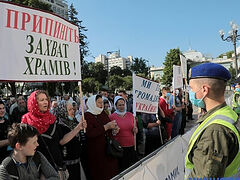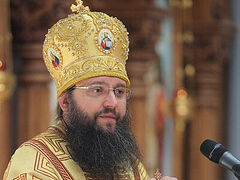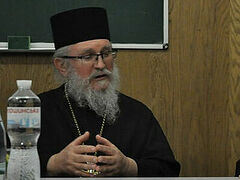PEOPLE THINK OF US AS ENEMIES, INVADERS, AND SEPARATISTS”
 Archpriest Stefan BalanI liked Ternopol very much. It’s a beautiful, clean town with ancient churches, parks, and a great lakeside recreation zone. You’ll rarely hear anyone speaking Russian there—as opposed to Kiev or the southern and eastern parts of Ukraine, Galicia has always remained a predominantly Ukrainian-speaking region. This so-called symbol of Ukrainian identity has become ever more prevalent over the last few years when the state actively pursued a policy supporting the use of the Ukrainian language (and purging the Russian language).
Archpriest Stefan BalanI liked Ternopol very much. It’s a beautiful, clean town with ancient churches, parks, and a great lakeside recreation zone. You’ll rarely hear anyone speaking Russian there—as opposed to Kiev or the southern and eastern parts of Ukraine, Galicia has always remained a predominantly Ukrainian-speaking region. This so-called symbol of Ukrainian identity has become ever more prevalent over the last few years when the state actively pursued a policy supporting the use of the Ukrainian language (and purging the Russian language).
Ternopol is a city of many churches—there are over fifty churches of various Christian denominations (which is a lot, considering it has 216,000 residents). About half of them belong to the Uniate (or Greek Catholic) Church, but the total number of Orthodox parishes (and it may seem extraordinary for someone unfamiliar with the specifics of this region) is even slightly greater than those belonging to Greek Catholics. Actually, the “Kiev Patriarchate” and the “Autocephalous Church” that united three years ago in the so-called “Orthodox Church of Ukraine” (OCU), definitely prevail in this area. The Ukrainian Orthodox Church of the Moscow Patriarchate, represented by just one church of Sts. Vera, Nadezhda, Liubov and Mother Sophia, is located on Konovalets Street in the city’s eastern corner.
The Ukrainian media is actively promoting the following concept: “The Ukrainian Orthodox Church (UOC) isn’t ours; it belongs to the aggressor nation; it should be banned”
I was riding in a taxi in Ternopol and intentionally asked the driver whether he knows what kind of a church is located on Konovalets Street. “Ah, that’s a Russian church,” was his response. His answer mirrored the fabricated identity actively promoted via Ukrainian media and politicians: “The Ukrainian Orthodox Church (UOC) isn’t ours; it belongs to the aggressor nation; it should be banned.” It’s promoted regardless of facts and day-to-day realities. Truly, how could a church be called “Russian” if its rector, clergy, and the majority of its parishioners are ethnic Ukrainians and were born and raised in western Ukraine? This terminology is particularly dissonant in Ternopol where Ukrainian nationalism (and the related hostility toward Russia and anything Russian) enjoys active support.
“I think propaganda is the reason why the locals call our church belonging to the Ternopol diocese ‘Russian,’” Very Rev. Fr. Stefan Balan, the Diocesan Secretary and the church rector, told me.
 The Cathedral Church of the UOC in Ternopol
The Cathedral Church of the UOC in Ternopol
I was truly grateful to Batiushka for the opportunity to meet him. My wife and I were passing through Ternopol on our way from Pochaev to Chernivtsi. We arrived there on Saturday and planned to leave by bus on Sunday afternoon. But even in such a short space of time, Fr. Stefan found time (following the Saturday Vigil) to sit down for a talk, answer my questions, and share his vision of the situation in western Ukraine.
A Ternopol-area native, he was born in the Borschev District of the Ternopol Region to a family of peasants. His family had three sons; all of them made a commitment to serve God and became priests. Stefan entered the seminary in St. Petersburg and, upon graduation in 1992, he was ordained a priest and assigned to serve in Ternopol.
“It so happened that when I arrived in Ternopol, the schism had just flared up,” Fr. Stefan says. “Our Nativity Church downtown has already been seized. Propaganda was pouring in on all levels, in equal measure from the Uniates, the ‘Autocephalous Church’, and the ‘Kiev Patriarchate.’ It was very hard for people to sort things out. We had to organize a home church at the Diocesan Office, and that’s where we prayed and served the Liturgy for six years. During those years, we were attacked twice, suffered beatings and robberies. Nevertheless, we’d come back and serve there until the local authorities officially demanded to vacate the building.
 Bake sale in front of the cathedral
Bake sale in front of the cathedral
According to Fr. Stefan, the authorities wouldn’t give the green light to a new location for the church “out of principle.” Owing to the great efforts of Vladyka Sergiy (the ruling hierarch), they managed to receive a parce of land on Konovalets Street that formerly belonged to a local college. That’s where the current church compound, the only UOC Church in Ternopol, was built.
“For many years, strong feelings of resentment against our Church have been cultivated here,” Fr. Stefan continued. “Many of the locals perceive us as ‘Moskals’ (a derisive name for Russians.—Trans.) and ‘enemies of the people.’ After 2014 (when the conflict in eastern Ukraine began) and 2019 (the creation of OCU), our situation deteriorated even further. At the time, we enthusiastically supported Poroshenko and put our trust in him. He at least called himself Orthodox; in fact, he used to be a sacristan at one of the UOC churches in Kiev. But it was during his tenure as President that strong pressure bore down on our Church. After the OCU was founded, lawlessness ensued, followed by active efforts to seize our parishes from us. There was nowhere for us to file any complaints. Once Zelensky came to power it abated a little, but we can see how waves of seizures of our churches are gaining momentum once again.
 Ternopol. Monument to Bandera
Ternopol. Monument to Bandera
“I’ll give one example illustrating what’s going on in the minds of locals. At the time of the Maidan coup, a throng of young men carrying sticks showed up in the cathedral. They thought we were hiding gunmen or the Russian military on church premises. We had to walk them through every room to prove that there was no one there. It seemed to calm them down. We shouldn’t be surprised at such a reaction, because they associate us with Russia, and there’s been so much negativity toward Russia for the last thirty years that many people have explicitly developed an antipathy to our eastern neighbor.”
—How many parishes in the Ternopol Diocese were seized after 2014?
We lost churches but the number of parishes didn’t decline as the majority of clergy and parishioners remained with the UOC
—They seized a lot of churches. People were beaten and kicked out. During Poroshenko’s rule, orders arrived straight from Kiev to re-register and strip the UOC of property ownership. We lost the churches but the number of parishes didn’t decline, because in the majority of cases, our clergy, as well as the parishioners, stayed with the UOC. Of course, in rural areas, people respond in various ways and, more often than not, they voted at village assemblies (attended not only by our parishioners but also by non-believers and even non-Orthodox) in favor of the transition to OCU. The local authorities eagerly accommodated these decisions, conducted the process of re-registration of church buildings, and seized the facilities. But then we would find other places for worship and even built new churches because both the clergy and a greater part of a parish typically remained under the omophorion of the UOC.
—But how did you manage to build new churches if it’s so hard, almost impossible, to buy land for a church in the Ternopol region?
—We purchase private land and either renovate an existing house to use it as a place of worship or build a new one to have an opportunity to conduct services there.
—Do the local authorities take the UOC’s position into account at all? Or do they completely ignore it?
On paper all confessions are equal before the law, but in reality this isn’t exactly the case
—We’re invited to attend the events and come to the meetings of the Council of Churches. On paper, all confessions are equal before the law, but in reality this isn’t exactly the case. Understandably, we’re treated as a “Russian,” “Moscow” Church. Metropolitan Sergiy has been trying for many years to buy land in Ternopol to build a second church. All to no avail. Despite everyone’s respect for Vladyka, despite personal connections, we can’t get anything done. Perhaps there are some officials who would be willing to help us but they’re afraid of negative consequences once the decision is made in our favor. Greek Catholics prevail among the folks up top here and they are negatively predisposed toward us. There was one incident at a funeral: A Uniate chaplain started talking about our Church, saying it was practically culpable for the death of a man killed in eastern Ukraine (whose funeral he was serving). They’re also mad at us because they expected a different outcome after receiving the tomos, since they assumed all the faithful would leave us and defect to this newly created “church,” the OCU. In reality, only a few willingly joined them.
 Protopriest Stefan Balan and Sergey MudrovAccording to Fr. Stefan, the local media rarely if ever shows the UOC in a good light— that’s how scared they are of accusations of supporting the “Moskals.” There aren’t any UOC chapels inside the local hospitals (they either belong to the Uniates or OCU), but priests are allowed to visit patients one-on-one (anytime there’s the need to hear confessions or give Communion to a member of the Orthodox Church). Access to public schools is generally not allowed except for the Kremenetsky District (near the Pochaev Lavra) and a few other areas where the UOC clergy can visit the schools. It’s easier with social services: The UOC clergymen are always welcome at children’s or nursing homes, where they come to fulfill their Christian mission of offering a helping hand to their neighbor.
Protopriest Stefan Balan and Sergey MudrovAccording to Fr. Stefan, the local media rarely if ever shows the UOC in a good light— that’s how scared they are of accusations of supporting the “Moskals.” There aren’t any UOC chapels inside the local hospitals (they either belong to the Uniates or OCU), but priests are allowed to visit patients one-on-one (anytime there’s the need to hear confessions or give Communion to a member of the Orthodox Church). Access to public schools is generally not allowed except for the Kremenetsky District (near the Pochaev Lavra) and a few other areas where the UOC clergy can visit the schools. It’s easier with social services: The UOC clergymen are always welcome at children’s or nursing homes, where they come to fulfill their Christian mission of offering a helping hand to their neighbor.
These days, to be a member of the UOC in the Ternopol Region is a great deed, almost a confession of faith.
—It often happens that our parishioners have to endure vilification even from their family members. For example, one family member attends our church while the rest of the family is against it. Scandals and misunderstandings ensue when people have to tearfully “break away” from their homes to attend services. We advise them to be patient and to exhibit love and meekness… If someone at work finds out that you attend our parish you’ll get in big trouble. There’s an unspoken rule here in the land of Ternopol that you can attend any congregation, even a sect, only the Church under the Moscow Patriarchate is prohibited. There were even slogans with the words of an OCU “metropolitan” spread all across Ternopol, stating, “Every candle purchased at an UOC church is a bullet aimed to kill a Ukrainian soldier.” Our poor people, the faithful, have to suffer through all this negativity and vitriol!
 Ternopol
Ternopol
—Fr. Stefan, we all know that things do change in our life, either for the better or occasionally for the worse. What do you think—is there a chance that the attitude toward the UOC will change for the better in the future?
—It’s unlikely. The people in the Ternopol Region, under all Ukrainian presidents, have consistently displayed negative attitudes toward us. The emotions run so high that I can’t even fathom where all this rage is coming from, because our opponents call themselves Christians. If they’re true Christians, they should know how to love and forgive. But we can’t prove anything. Politics and nationalism loom large. The people think we’re their enemies, invaders, and separatists. That’s the education everyone receives here—from generation to generation, as early as kindergarten and elementary school. Across the board, they talk about us exclusively in negative terms, and that’s why, I’m afraid, we can’t expect to see any changes for the better. It seems our Church is doomed to be squeezed not only out of Galicia but also the rest of Ukraine.
11/10/2021










No hay comentarios:
Publicar un comentario